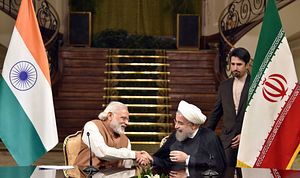As the May 12 deadline for the Iran nuclear deal draws near, all eyes are on the Trump administration and the frenetic diplomatic efforts being undertaken by European nations to save the agreement. Led by Prime Minister Narendra Modi, in recent years India has successfully enhanced its ties with the United States, Israel, and Saudi Arabia, countries that view Iran as a strategic threat in the region. That New Delhi has managed to draw closer with Iran’s strategic rivals while continuing to enhance its ties with Tehran is no small achievement. A U.S. decision to withdraw from the nuclear deal, however, could test the limits of India’s foreign policy and have serious implications for New Delhi.
The signing of the Iran nuclear deal under the Obama administration signaled a potential end to Iran’s economic isolation, allowing India to further enhance strategic and economic ties with Tehran. This led to a three-day trip to New Delhi in February 2018 by Iranian President Hassan Rouhani, the first such trip to India by an Iranian president in 10 years. Nine deals were signed during this trip, including an agreement to lease part of the strategic port of Chabahar to an Indian company. The joint statement released at the end of the trip “recognized the unique role of Iran and India in promoting multi-modal connectivity within and across the region” and India “reaffirmed its support for full and effective implementation” of the Iran nuclear deal.
Besides being a key source of crude oil for India, Iran is critical to India’s regional policy as it seeks to balance against China’s growing influence in South Asia. Pakistan and China have been strategic partners for decades and the ongoing China-Pakistan Economic Corridor has further cemented this strategic relationship. Through the Belt and Road Initiative (BRI), China has also successfully enhanced its role in both South and Central Asia by providing billions of dollars in economic assistance and investment to countries like Pakistan, Sri Lanka, Nepal, Bangladesh, and Kazakhstan.
Given that Pakistan does not allow India land access to Afghanistan and Central Asia, New Delhi is left with Chabahar as the only access route into Afghanistan and Central Asia. It has already committed over $500 million to the development of the port, which was operationalized last year when India sent a shipment of wheat to Afghanistan via Chabahar. India views this port as an alternative to the Pakistani port of Gwadar, which lies 140 kilometers east of Chabahar and is being developed by China as part of the China-Pakistan Economic Corridor.
Historically, India has showcased an uncanny ability to maintain strategic autonomy during periods of geopolitical turbulence. However, ongoing developments in the region could test the limits of India’s foreign policy and make it very difficult for India to continue to maintain close ties with both Iran and its strategic rivals. If the United States withdraws from the nuclear deal, both Saudi Arabia and Israel are expected to intensify further their efforts to combat Iranian influence in the region. In such a scenario, New Delhi may have to limit its investments in Chabahar or risk facing blowback from Washington, Tel Aviv, and Riyadh.
New Delhi’s growing closeness with the United States, Israel, and Saudi Arabia has also led Iran to hedge against a change of heart in New Delhi: during a trip to Pakistan in March, Iranian Foreign Minister Javad Zarif invited Pakistan to participate in Chabahar’s development and expressed a desire to connect Gwadar and Chabhar. A U.S. withdrawal from the nuclear deal could open the door for Pakistan to explore an accommodation with Iran that limits India’s reach into Afghanistan and Central Asia. China, which has successfully enhanced its influence in the region and is the largest importer of Iranian crude oil, could offer Iran economic assistance under the BRI and undercut India’s proposed investments in Chabahar. This process could be further accelerated by Iran’s strategic ally Russia, which has also drawn closer to both Beijing and Islamabad as it seeks to balance against closer U.S.-India relations and tries to find a way to limit U.S. influence in Afghanistan and Central Asia.
India’s ability to counter growing Chinese influence in the region and have strategic access to Afghanistan and Central Asia rests on its ability to maintain close ties with Iran. With the Iran nuclear deal facing an uncertain future, Modi and India’s foreign policy establishment must tread carefully in a volatile geopolitical environment. Pursuing a closer relationship with Iran increases the risk of blowback from Washington, particularly in the form of angry tweets or comments from Trump. Stepping back from engagement with Iran, however, leaves the door open for India’s rivals to woo Tehran into their camp. The near-term repercussions of the U.S. decision to withdraw from the Iran nuclear deal will most certainly test India’s foreign policy as well as the U.S.-India relationship. In the long term, it may allow India’s regional rivals to bring Iran into their camp and further their geopolitical ambitions in South and Central Asia.
Uzair Younus is a Director at Albright Stonebridge Group. Views expressed are his own.

































